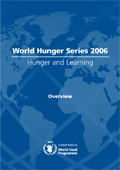
|
Published in : 2006 Available in : English When most people think about hunger, they focus on its physical manifestations: the emaciation of famine-affected populations, the small stature of chronically malnourished people. But for those who survive hunger, perhaps its most damaging impact is its legacy for learning. Hunger in childhood can lead to irreversible mental stunting, lower intelligence quotients (IQs) and reduced capacities to learn. The effects are tragic for individuals and staggering for nations. It is estimated, for example, that the average IQs of the populations in over 60 countries are 10–15 points lower than they could be, because of iodine deficiencies alone (UNICEF and Micronutrient Initiative 2004). Documents : Arabic (PDF, 508.10Kb) English (PDF, 520.69Kb) Spanish (PDF, 532.92Kb) Originally posted at : WFP Website |
|
This resource is listed under: Themes : Interventions, general, Nutrition planning, policy and programme, general, Undernutrition, general Resource types : Reports |
|